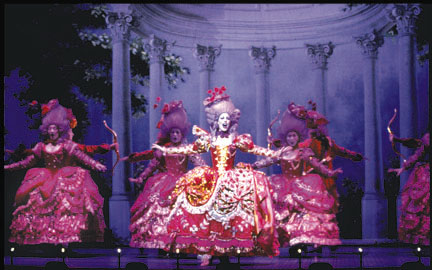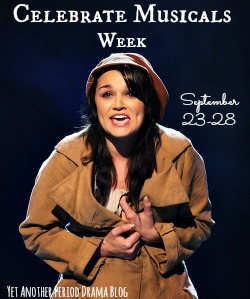Warning: the following post contains a serious amount of what I call philosophical silliness, which is trying to discern too much meaning from something the culture produces. I do this a lot--kind of like those medieval theologians who go crazy with analogies, only I'm not as smart. Also, the original context for this song is not nice (nice: refined, lovely). If you're fine with PotO, you're probably okay with this (okay as in your filter levels are adequate to handle this). If not, ask your parents. :D How's that for a disclaimer? All right. Onward, ho!
Like "Vivez!" when I first heard this song, I liked it very much. I recall a dear friend, upon listening for the first time, sighing, "I know exactly how she feels!" She was joking, of course, but perhaps with a grain of truth. Those of us who read too many novels (especially about dashing Englishmen who are alter-ego heroes), tend to find ourselves "Flying, sighing, 'where, where, where is my storybook ending?'" (C'mon, you know you like that line, even if you hate the rest of the song). In other words, we sometimes find ourselves falling prey to escapism, that is, desperately wishing we lived in another time, another world, or just another place. This is hardly healthy--and I think that this is what this song is about.
Unfortunately, my initial positive impression of this song was marred when I read the plot of the musical--in this scene, Marguerite has tossed aside her trust in the Scarlet Pimpernel (this seems to run in the family!) and gone to Paris to try to save Armand. She sings this song in a not-so-nice venue, dressed as a not-so-nice 'lady' (thinking Les Mis song title kind of 'lady,' here), trying to get information from a bunch of soldiers about her brother.
I know, I know. Ridiculous. This scene renders Marguerite as unlikeable as Armand-from-the-movie.
Once I realised this, I started subconsciously redefining 'love' as it would be taken under the context (hardly Platonic, shall we say), and that kind of ruined the song. I tell you, English needs about ten more words than it has for 'love.' And French is even worse!
However, I recently discovered that in the new versions of the show, this is one of the first numbers--Marguerite St. Just is singing it onstage in her play. Now, I'm not saying that all plays are lovely--see the scene above--but somehow the oh-so-elegant white poofy gowns (they must be white and poofy!) and the pretty set--the completely different context--seem to imply a different meaning to the word love.
of course, I imagined something a bit more like this... |
than that ^
Of course, this might apply:
“It is wonderful how Virtue turns from dirty stockings; and how Vice, married to ribbons and a little gay attire, changes her name, as wedded ladies do, and becomes Romance." ---From Charles Dickens' Preface to Oliver Twist, printed in 1841
...but I don't think it does, here. Context is important.
Thus, if the singer is acting inappropriately, the song is interpreted differently. On the other hand, if the singer is just (just, St. Just, get it? ouch) trying to bring herself back into the real world, then I think it's fine. Some of the lines are still a bit uncomfortable, though.
On the fourth hand (I'm starting to look like some Asian 'deity' with all these arms), I showed these lyrics to my mother and asked her what she thought they meant. Her answer was a grimace and, "Nothing. They're just nonsense. But I bet it has a pretty tune, and that's why it's in there."
She's right--the tune is very pretty, indeed. I like the music on the earlier version best, but the new one with the harp is pretty, if it's not too slow.
Listen to me, I have beautiful dreams I can spin you,
Dreams to linger within you
Close your eyes and we'll ride my carousel
Dreams to linger within you
Close your eyes and we'll ride my carousel
(I love how she introduces it--makes it almost like a frame narrative)
I'll sing you stories of lovers whose love used to fill me
(or, she's going to tell us about her favorite literary couples)
I'll sing you stories of lovers whose love used to fill me
(or, she's going to tell us about her favorite literary couples)
For the lovers who will be
For, you see, love is one thing I do well
(I don't know what exactly this is supposed to mean, so I usually change it to 'one thing I know well," which reminds me of Don Quixote reading all those romances and then going crazy)Come, let's believe love can be just as sweet as it seems
Let's live on dreams!
In my dreams, such beautiful lovers have found me
Storybook lovers surround me
Nothing is real, but I'm flying, sighing
Where, where, where is my storybook ending?
Why does my golden pretending
Leave me with nothing to hold but my dreams?
Let's live on dreams!
In my dreams, such beautiful lovers have found me
Storybook lovers surround me
Nothing is real, but I'm flying, sighing
Where, where, where is my storybook ending?
Why does my golden pretending
Leave me with nothing to hold but my dreams?
(this is probably my favourite verse--sort of a, "You mean Mr. Darcy isn't real?! What?!" moment--only it's not fair because she's married to Sir Percy...)
Oh, is it only in dreams that we find our ideal love?
Are there lovers with real love?
If you know how to feel love, show me how
Ah, but my prince, if you can't be as sweet as you seem
I'd rather dream
(this last line is, I think, the funniest)
Come and wake me!
Come be the love I can hold now
Storybook love leaves me cold now
Show me the way to stop dreaming
There is only one perfect storybook ending
That is the end of pretending
That is the moment I say, love me now!
Oh, is it only in dreams that we find our ideal love?
Are there lovers with real love?
If you know how to feel love, show me how
Ah, but my prince, if you can't be as sweet as you seem
I'd rather dream
(this last line is, I think, the funniest)
Come and wake me!
Come be the love I can hold now
Storybook love leaves me cold now
Show me the way to stop dreaming
There is only one perfect storybook ending
That is the end of pretending
That is the moment I say, love me now!
(this verse shows her wanting to escape her escapism, which is admirable. I just wish it were a bit more general than just romantic love)
And this is where you yell in French...
Et sur mon manege, l'amour toujours est chantant
De mes reves, c'est le commencement
Et j'espere une fin heureuse
Mais la fin de l'histoire ne vient pas tres doucement
Pour l'histoire, il faut faire semblant
Certes je n'embrasse que mes reves
Seuls mes reves!
Et sur mon manege, l'amour toujours est chantant
De mes reves, c'est le commencement
Et j'espere une fin heureuse
Mais la fin de l'histoire ne vient pas tres doucement
Pour l'histoire, il faut faire semblant
Certes je n'embrasse que mes reves
Seuls mes reves!
(If you, like me, can't pronounce the words, just think of all the French words you do know, and arrange them to fit the meter. Then, yell them loudly with a French accent. An attempt might look something like this:
Bonjour, um, la chat, um, une deux trois...
Les poissons, au revoir la la la
um, les miserables, Enjolras, Gavroche...
um, Thenadier sounds French, um, une deux trois again,
Chauvelin is...evil..umm...
les poissons...les poissons...
...you get the idea)
Overall, I can't help liking this song. Unfortunately, it is yet another thing that I have to like with a disclaimer (I have a very extensive list of those). I don't think it's worse than "Music of the Night," when interpreted at its worst, and it's probably better philosophically than "Vivez!"
Plus, it's fun to yell in French.





